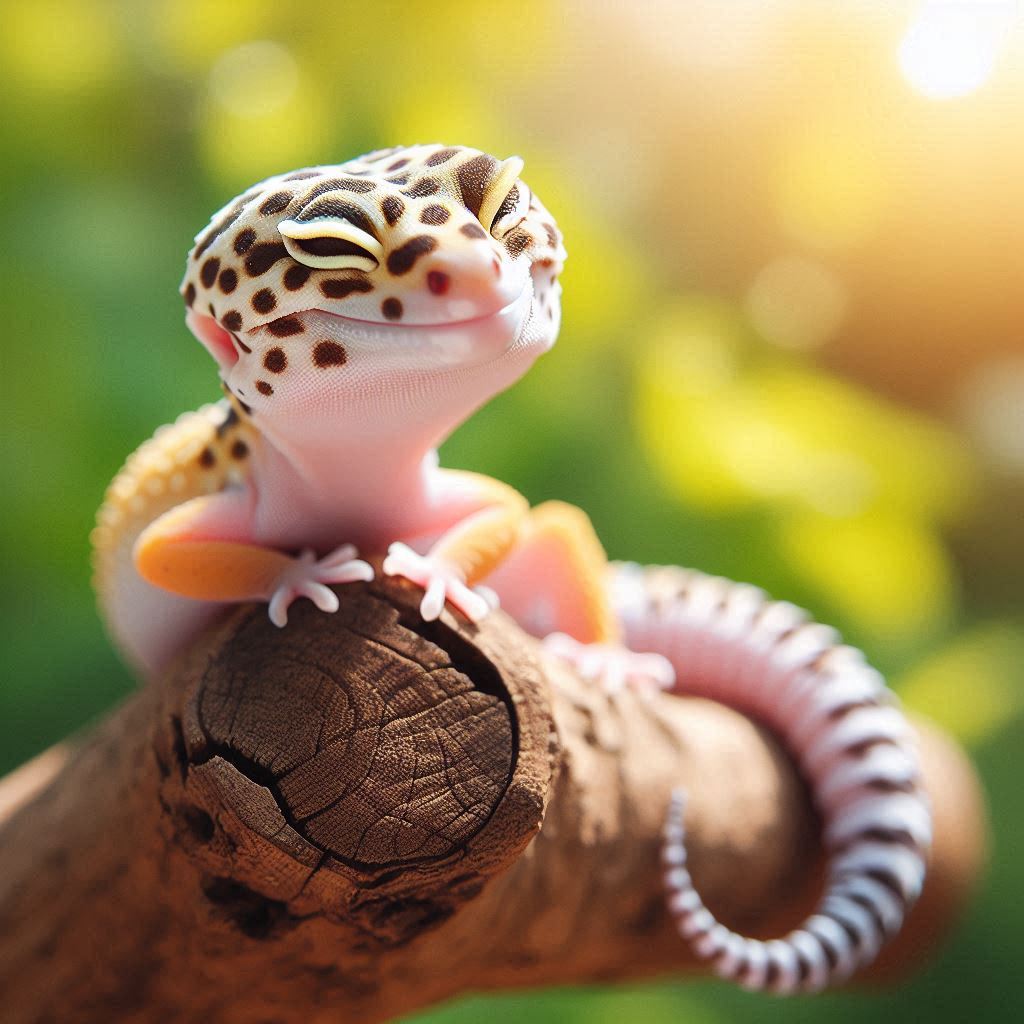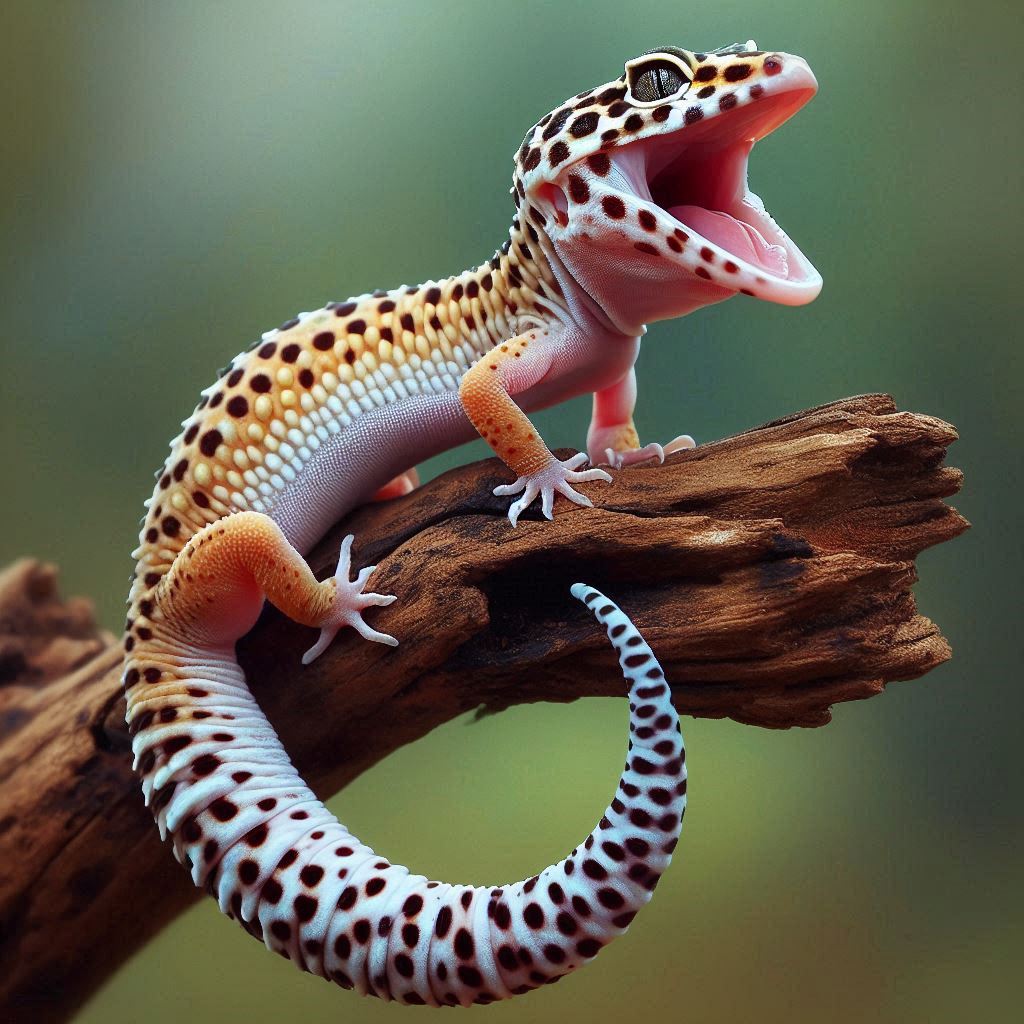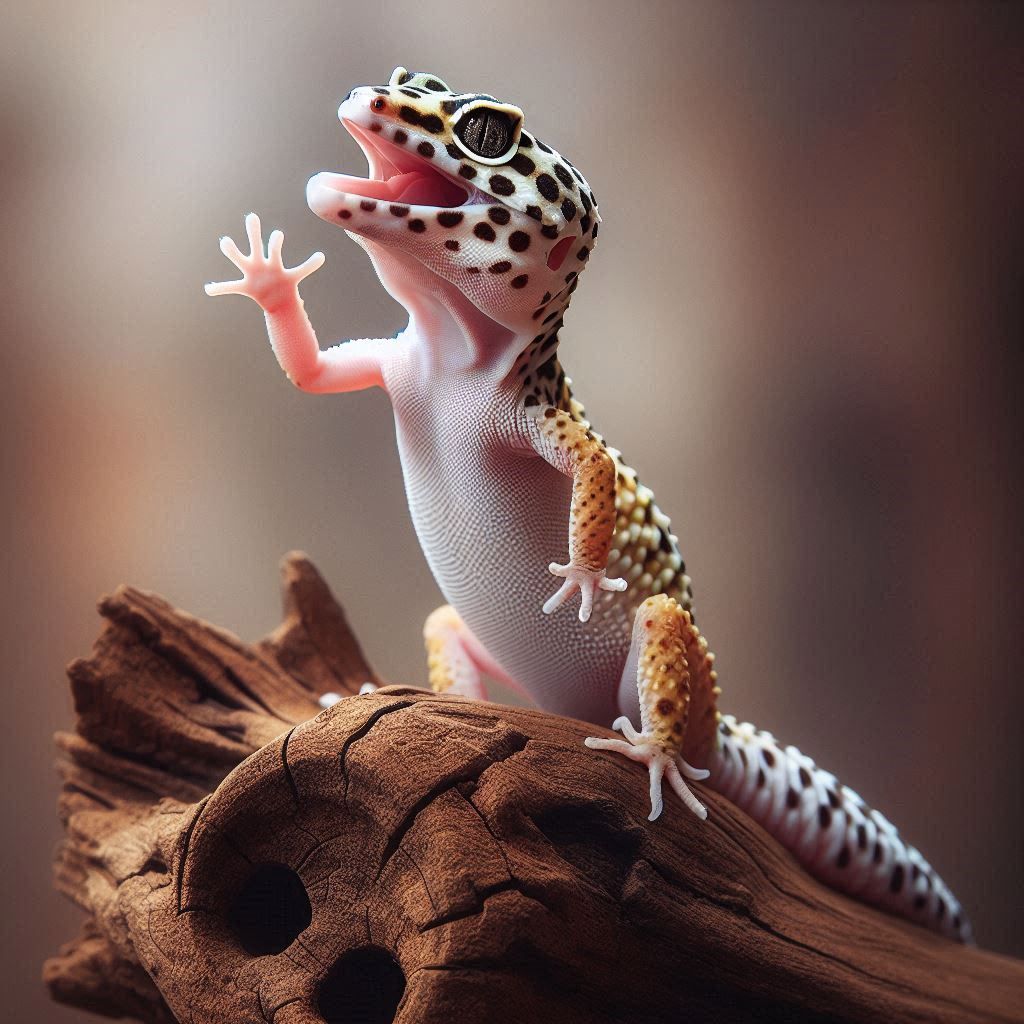
Does Leopard Gecko Scream? Why Do Leopard Geckos Squeak? Do Leopard Geckos Chirp? Do Leopard Geckos Bark? And Finally, Does a Leopard Gecko Clicks?
I hope you have at least one of these questions in your mind before landing on the article. IF yes, then you are in right place.
Have you ever heard a Leopard Gecko making sounds? Several times maybe. Leopard Geckos make multiple noises in order to express their emotions.
With every single voice or noise of geckos, you can guess what your leopard gecko is thinking.
As a new Leopard Gecko hobbyist, their different sounds and noises might surprise you. But there’s hidden meaning behind each of them.
But before we jump in discussing what noises do Leopard Geckos make? Let’s first learn about the reptile.
Who is a Leopard Gecko?
Leopard Gecko belongs to the reptile family and is a ground-dwelling lizard.
It is native to Asia and is commonly found in India, Afghanistan, Iran, Nepal, and Pakistan.
You can commonly encounter them in rocky dry grassland and desert regions.
Leopard Gecko is also the first domesticated lizard in the world.
For beginners, they are great to pet and even easier to maintain.
However, before bringing a Leopard Geckos as a pet, you must deeply study them.
Petting an uncommon and new animal/ reptile requires a good understanding of them.
From eating habits to likes, dislikes, physical & emotional formations, and other habits.
With that, let’s learn about the noises that Leopard Geckos makes.

What kind of noises does Leopard Geckos make?
Leopard Geckos can make a variety of sounds. However, some of their common noises include screaming, chirping, squeaking, and barking.
Leopard Geckos are not like the other animals who feel happy being vocal. Any sound they make particularly is a sign of some or the other feeling or action.
Even though all Leopard Geckos make the same sounds, every single one of them will sound a little differently.
5 common noises Leopard geckos can make
What are the common Leopard Geckos Sounds? What does Leopard Geckos noise mean?
Well, here are the 5 common sounds pet and wild geckos usually make.
- Screaming–Squeaking
- Chirping
- Barking
- Clicking
- Screaming–Screeching
Here is the detailed meaning of each Gecko Sounds we hear:

1) Screaming and Squeaking
If your Leopard Gecko is screaming or squeaking, possibilities say that they are either unhappy or hurt.
Even though these sounds may feel cute and entertaining to you, your Leopard Gecko is likely feeling threatened.
As per animal scientists and researchers, Leopard Gecko screams or squeaks as an evolutionary trait to startle the potential predator.
2) Chirping
Leopard Gecko often chirps to define territory or to call for mating. Or, if they are mishandled, you may hear chirping noises often.
Your first take here must learn how to safely handle your leopard gecko and make them feel comfortable.
Also, avoid bringing your hand over their head, or they in defense and fear will chirp.
Leopard Gecko may also chirp due to the stress of their new home. It takes nearly two weeks for them to blend with the new environment.
At times, hunger can lead your Leopard Gecko to chirp. Once you hear such sounds, try offering them some food.

3) Barking
It isn’t really common for Leopard Gecko to bark. Though if they do so, it means they are feeling threatened or are getting stressed.
Leopard Gecko’s Barking will sound a little hoarser. If you ever hear any such sound, do check them immediately and ensure their safety.
4) Clicking
Like any other Leopard Gecko noises, clicking is in no way a positive sign. While you hear a Leopard Gecko making clicking sounds, it means they are feeling annoyed, stressed, or uncomfortable.
Most of the time, while your Leopard Gecko is shedding or you are handling them, you may hear click sounds. As and when make sure you stop there and let the pet relax on its own.
5) Screaming or screeching
Leopard Gecko can scream really loud, to the extent that one can hear it from afar. They often screen while feeling stressed, frightened, or threatened.
Screaming noises mean that your Leopard Gecko is actually going into a defensive mode.
Be cautious and check whether they are in danger from something. If so, consider comforting them. Make sure you are gentle.
Juvenile Leopard Gecko screams really loud, but you will rarely hear adult Geckos screaming.
Leopard Gecko body language and behavior
Apart from making sounds or noises, Leopard Gecko actively shows several other behaviors as well. Let’s put some light on a few common amongst them.
- Staring Endlessly
- Flicking their tongue
- wiggling or shaking tail
- Shyness or hiding
- Climbing out of the tank

1) Leopard Gecko can stare at you endlessly
Leopard Gecko can stare at you continuously; It is very common for a Leopard Gecko to stare.
They might not do so in the wild, but when in captivity, they can stare endlessly.
Often while you make a movement, even a slight bit, Leopard Geckos will become attentive.
They will stare at you in order to determine whether you are a threat to them or not.
Their eye movement is usually to figure out whether there is a predator or prey around them.
What if Leopard Gecko does not stare?
Every Leopard Gecko is different, and many of them might not stare at movement or anything.
Because it is very common for a Leopard Gecko to stare, not doing the same worries many pet owners; however, this behavior is also completely normal.
But Always look for signs of unusual behavior to make sure the leopard gecko is not sick.
2) Leopard Gecko will flick their tongue quite often.
Another common physical behavior amongst Leopard Gecko is tongue flicking.
They do so in order to familiarize themselves with their surroundings.
There’s a small olfactory organ on the tip of their tongue that provides them a sense of smell.
3) A Leopard Gecko will wiggle or shake his tail.
Tail is the primary tool to communicate between Leopard Geckos.
While they are wiggling or shaking their tails, they are communicating with their mates.
If the process speeds up, it means they are telling other members of the species about feeling irritated or threatened.
Male Leopard Gecko also wiggles their tale in order to introduce themselves to the females from their tribe.
4) You may find your Leopard Gecko hiding.
It is uncommon for Leopard Geckos to hide during the daytime. Because these reptiles are highly active during the evening hours, pet owners can worry about their sudden hiding.
They may hide due to stress or fear of the new environment or simply feel safe and protected.
Or, if the tank temperature is really cold, Leopard Geckos can hide for a longer time (even more than a day).
Because Leopard Geckos are cold-blooded reptiles, they require the warm temperature to regulate, perform bodily functions and survive.
5) Leopard Geckos can climb out of the tank.
It is common for Leopard Geckos to climb their tank or other vertical spaces around.
But at times, they might do so to get out of the environment, sensing something wrong.
Temperature, other tank mates, or other reasons can result in Leopard Geckos climbing out of their tank.
Why Leopard Gecko Is Chirping or Clicking?
Here are 10 Reasons why leopard geckos make noise.
- Clicking and Chirping as a Results of Mishandling the Gecko
- When Leopard Gecko is not familiar with New Home or enviroment.
- The surrounding insects or high frequency devices stress Them Out.
- When Leopard Geckos is Hungry or to ask for food they make noises.
- Your gecko is hurt or sick it may create some unsual sounds.
- Frequency of Handling Prevents or Triggers Clicking in Geckos.
- Leopard Gecko Tank or enclosure it lives in is not Ambient.
- The Leopard Gecko is afraid or fearing from other domestic pets.
- Leopard Geckos is Stressed Or Feeling Territorial Competition.
- Leopard Geckos are simply busy in gaining female attention via Mating Calls.
Are Geckos Reptiles Or Amphibians?
A gecko is a reptile while a salamander or newt is an amphibian.
Although there are few similarities between the two, such as both amphibians and reptiles lay eggs and are cold-blooded animals but they belong to different genus and orders.
Reptiles can’t live in water or breathe through their skin while amphibians can do that easily.
Reptiles include snakes, lizards, turtles, tortoises, crocodiles, and alligators.
While Amphibians include Frogs, Toads, and Salamanders
Frequently Asked Questions
Yes, these reptiles make one of the best pets, and it takes minimal to care for them. Leopard Geckos does not need a lot of attention as well.
Leopard Gecko does not bite at all. Or even if they do, the person may neither feel nor will it draw out any blood. Also, they are not at all poisonous.
Yes, Leopard Geckos are highly sound sensitive, and it can really stress them.
A door bang or any such similar noises can scare them, resulting in hiding under spaces.
Make sure you refrain from making such sounds, or they won’t feel comfortable around.
The only bond between a Leopard Gecko and its owner is by way of handling them. There is no more possible bond one will encounter.
Leopard Gecko is solely dependent upon meat. Except for meat, they cannot eat or digest other food items.
Yes, They Do sneeze, And The Noise They make is Sometimes Described as coughing.
They usually Sneeze while Debris is In Their Mouth, Nostrils, or when facing a Respiratory Infection.
Conclusion
If you are a Leopard Gecko owner, you will hear some weird voices at some or other point in time. Leopard geckos are highly vocal creatures.
But even though sounds and noises are common for them, it is an alert sign for pet owners.
By listing to the sounds, determine the issue in the first place, and then make sure you resolve it earliest.
